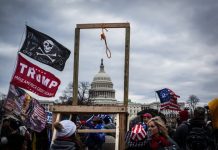Last October, Rebecca Musarra, a Philidelphia attorney, was arrested for “obstruction of justice” after exercising her right to remain silent during a traffic stop involving two New Jersey state troopers.
The incident took place on Route 519, near the New Jersey-Pennsylvania border. Police documents show the attorney was pulled over just before 9:30 p.m. under the suspicion that she was speeding. The officer who initiated the stop was Trooper Mathew Stazzone, who was quickly joined on the scene by a second trooper, Demetric Gosa.
Dashcam footage captured the entire incident on video. It shows Stazzone approaching Musarra’s vehicle on the passenger side. The trooper asked her for her license, registration, and insurance.
While she was gathering her documents, Stazzone asked:
“While you’re looking for that, do you know why you’re being pulled over tonight?”
In the video, Musarra hands Stazzone her documentation but doesn’t reply to his question.
After asking the same question several more times, Stazzone then makes his way to the other side of Musarra’s vehicle. He knocks on her window with his flashlight, again demanding that she answer his question.
“You’re going to be placed under arrest if you don’t answer my questions,” he told her. Musarra claims the force of the flashlight chipped her window.”
In the video, you hear Musarra tell Stazzone that she doesn’t have to answer questions. She also informed him that she was an attorney.
Stazzone orders Musarra out of the car and begins placing her under arrest. The attorney asks him, “Are you detaining me because I refused to speak?”
“Yeah,” Stazzone replied, according to the video. “Yeah, obstruction,” Gosa added.
Ironically, as the troopers placed Mussarra in the back of the patrol car, Stazzone read the attorney her Miranda rights which included “you have the right to remain silent.” They then took her to a police barracks in Washington.
State police have not released any video of Musarra inside the station where she was processed and detained.
Mussara has recently filed a federal civil rights suit, presumably against the State of New Jersey. In the lawsuit, she claims that she was patted down two more times at the station and handcuffed to a bench inside a holding cell. Mussara claims the troopers refused to facilitate her request to call her parents, promising they would call on her behalf, but they never did.
The attorney also claims a supervisor, Trooper James Butler, later visited her cell and asked her what happened.
“I said, ‘Well, the trooper arrested me for not answering his questions,'” Musarra told NJ Advance Media. “And the supervisor indicated (to me) that was obstruction.”
However, New Jersey’s obstruction statue defines criminal act much differently. Under New Jersey law, obstruction is defined as impeding law enforcement using “flight, intimidation, force, violence, or physical interference or obstacle, or by means of any independently unlawful act.”
Musarra and Butler left her cell to review the 30-minute dashcam footage. She claims that Butler returned 30 minutes after they watched the footage and told her:
A mistake was made, and to chalk it up to training, and that (Stazzone) was just a rookie.
Records show that both Gosa and Stazzone joined the division in 2014.
Musarra claims Butler was suddenly very gracious. He offered to get her vehicle, which had been towed, out of the impound free of charge as “a favor” and once again apologized for the “misunderstanding.”
Records show Musarra was never charged with obstruction, nor was she issued a summons for any traffic violations.
Musarra works for a Delaware firm as a private attorney. Her firm occasionally represents immigrant children in legal matters pro bono. Musarra said that she came from “a law enforcement family.” As she mentioned in the video, her father is a former Warren County prosecutor, and her mother is a former probation officer.
Musarra says she understands “cops have a difficult job to do,” however, she added, “there has to be some sort of accountability.”
“Who knows what will happen to the next person who comes down the road who decides they have these constitutional rights they want to assert?” Musarra said. “What happens to them when they don’t have the sort of privileges I have?”
Spokesmen for the state police and the Attorney General’s office that’s representing the troopers in the lawsuit declined to comment on the case.
However, state police spokesman Capt. Stephen Jones said via email:
“In every instance where misconduct is alleged against a trooper or troopers, as is the case here, (the division’s internal affairs office) will review the allegations and investigate the facts.”
“In the event that problems are identified, training and/or disciplinary measures are implemented where appropriate.”
The State’s attorneys have filed to have Musarra’s case dismissed, claiming that the troopers “acted in good faith and without fraud or malice.”
What’s more unbelievable than the state’s defense is that there’s a good chance it could work.
Ignorantia juris non excusat or ignorantia legis neminem excusat roughly translated from Latin means “ignorance of the law excuse not” and “ignorance of the law excuses no one.” This applies to anyone who travels to any state in America. If you break a local law and claim ignorance, your defense will not hold up in court. That is unless you’re a law enforcement officer.
On December 15, 2014, the Supreme Court ruled 8-1 that police officers are not accountable for making decisions based on their ignorance of the law they are paid to enforce.
The case stems from a traffic stop in North Carolina, where Nicholas Heien was pulled over for a broken taillight, police searched his car and found drugs. However, police did not have the legal authority to search his vehicle, because a broken taillight did not constitute a “crime” which would have given them the probable cause to search.
In Heien vs. North Carolina, the justices found that despite not having probable cause, the officer’s ignorance was “reasonable,” therefore, the search didn’t violate Heien’s 4th Amendment rights and that the evidence found from the search was admissable in court.
That Supreme Court case could be used by the state attorneys to get the troopers off the hook.
https://www.youtube.com/watch?v=zujltWbP930
According to the police, “Blue Lives Matter,” but your rights? Not so much.




